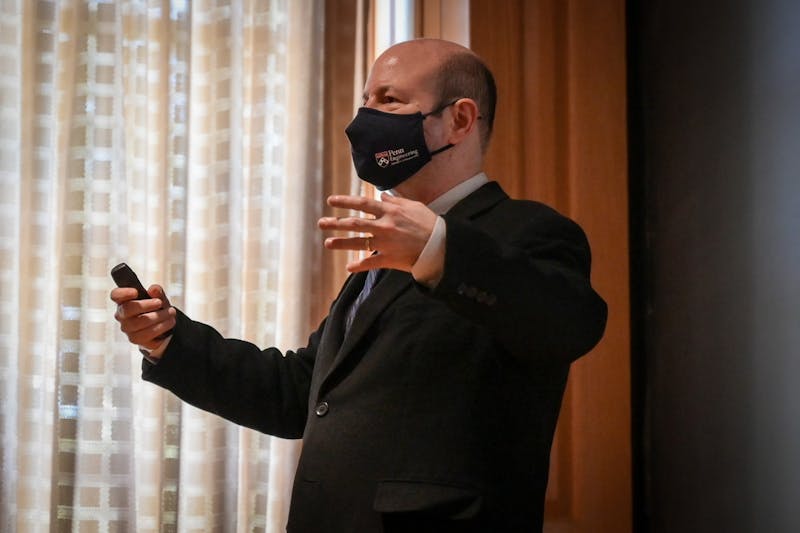
The University and Gene Therapy Program Director James Wilson filed a motion to dismiss a lawsuit by a former program employee.
In their response, Penn and Wilson argue that the plaintiff, Susan Faust — who worked as a postdoctoral researcher at Penn’s GTP from 2010-13 — “failed to plead any claims on which relief can be granted.” The initial lawsuit alleged that the University committed “unethical and illegal conduct” regarding the licensing of technology she invented at Penn. The filing asked the court to dismiss Faust's lawsuit in its entirety.
The original breach of contract lawsuit filed by Faust alleges that the University violated its patent policy by withholding information regarding licensing agreements for technology she invented and failing to compensate her. It asserts that the University conducted itself “more like an illegal monopolist than a research institution.”
The lawyers representing the University declined to comment.
Penn's motion to dismiss called Faust’s complaint “too late and too little,” arguing that the statute of limitations has expired on her asserted claims and that her claims are based on “no more than conclusory allegations” rather than “requisite plausible facts.” While the defendants “dispute the veracity” of the allegations in the complaint, the motion to dismiss did not engage with the substance of Faust's allegations.
Penn's motion argues that the statute of limitations for several counts filed in the lawsuit by Faust — such as the University's failure to notify and pay royalties to Faust for the Biogen license — expired between 2018 and 2023.
The motion states that Faust knew or should have known of “the key aspects of each of [her] asserted claims prior to the statute of limitations’ expiration.”
In a statement to The Daily Pennsylvanian, Ross Wolfe, one of the attorneys representing Faust and an associate at Kang Haggerty LLC, wrote that Penn’s response “fails to respond to the substance of Dr. Faust’s allegations but instead requests the complaint be dismissed largely on the grounds that the statute of limitations has run.” He contended that Penn's response failed to account for its behavior towards Faust, demonstrating that the University "has no legal or ethical justification for its conduct towards Dr. Faust."
"We are confident that the Court will reject the University of Pennsylvania's statute of limitations defense and allow this case to proceed," he added.
The lawsuit centers around an adeno-associated virus vector technology used to deliver gene therapy that was developed by Faust, along with Thomas Jefferson University researcher Joseph Rabinowitz, in 2013 when she was a postdoctoral researcher at GTP.
The original complaint alleges that Penn entered a licensing agreement with Biogen Inc. for Faust’s AAV vector technology, along with 11 other patents, with a combined maximum value of $2 billion — which was announced in a 2016 Biogen press release. It also claims that a licensing agreement exists between Penn and RegenxBio, including Faust’s patent.
The lawsuit contends that Penn failed to notify Faust that her technology was being licensed and was the only inventor of the 12 technologies that were licensed to Biogen who was not compensated. It alleges that Faust founded NxGEN Vector Solutions in 2017, after leaving Penn, with the intent of commercializing her work — but has been blocked from doing so by the University.
In contrast, the motion to dismiss contends that the lawsuit failed to identify any prospective contractual relationships or potential licensees for NxGEN. It alleges that Faust provided "insufficient facts" to support the speculation that “Penn Covered Entities” or RegenxBio own a license for Faust’s patent, also arguing that Faust did not sufficiently demonstrate that the University benefited from withholding any owed patent royalties from her.
Wolfe told the DP in February that his client believes that the University’s anticompetitive conduct is an attempt to prevent Faust from commercializing her technology because it competes with Wilson’s own patented AAV technology.
The lawsuit specifically cites Wilson’s NAV capsid platform technology — with which Wilson’s gene therapy company RegenxBio was founded — as the competitor to Faust’s AAV vector technology.
In the lawsuit, Faust requested the court to award her complete ownership of the patent and compensation for Penn’s misconduct.
“This is something she’s worked for her entire life — not just at Penn, but before she even got to Penn,” Wolfe told the DP in February. “It has been a long journey for Dr. Faust, and she’s ready for her day in court.”
The Daily Pennsylvanian is an independent, student-run newspaper. Please consider making a donation to support the coverage that shapes the University. Your generosity ensures a future of strong journalism at Penn.
Donate












